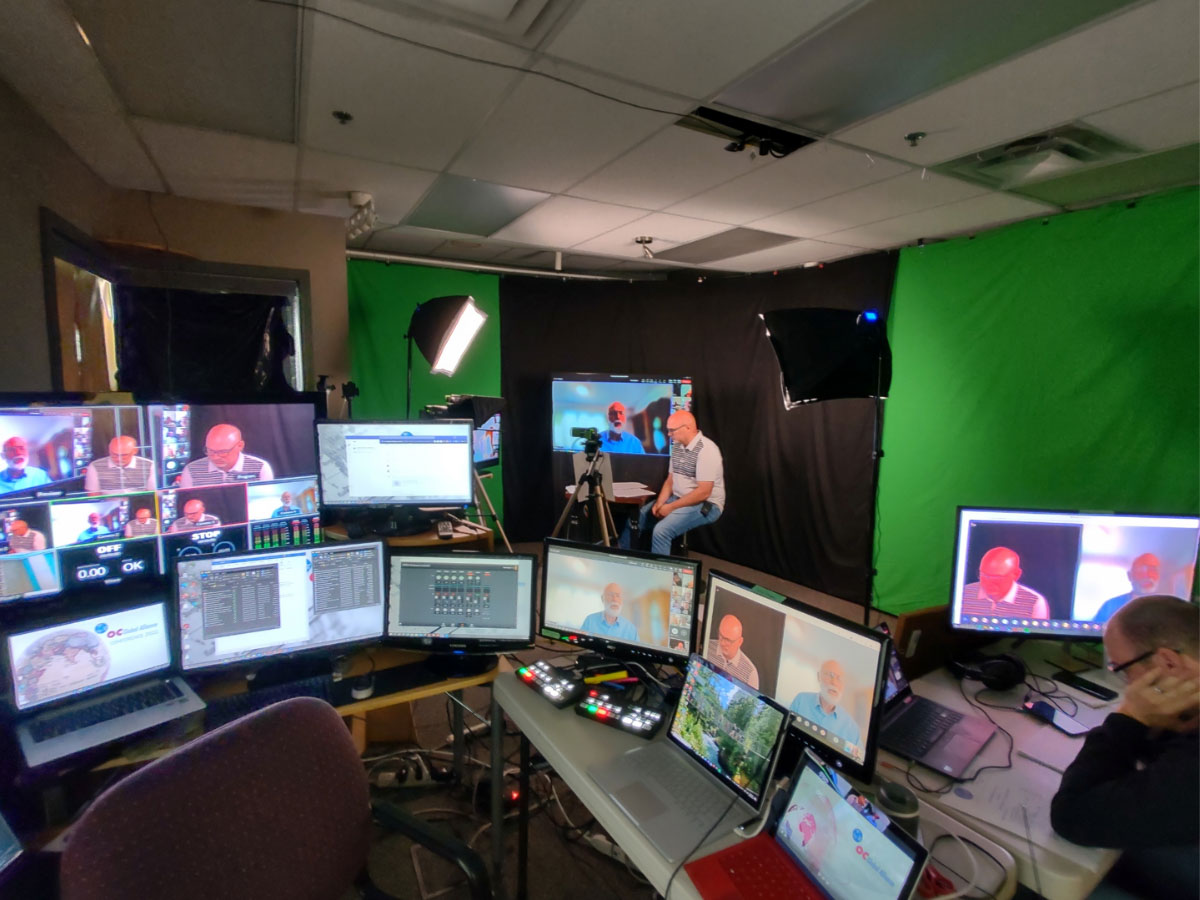
Serving Leaders Globally

Outreach Canada is the Canadian partner of the OC Global Alliance, a Missionary sending partnership with 1,200 workers serving in 99 countries. Working with our alliance through the pandemic posed some initial challenges when we had to cancel our face-to-face gatherings. Cooperation and collaboration within our alliance are dependent on solid leadership relationships and effective communication. The pandemic forced us to recognize our dependence on travel and international gatherings and consider new ways of connecting globally. As a result, we have discovered new opportunities to communicate and collaborate in highly effective ways.
This blog will highlight three ways that we have used technology to serve the international leaders of our OC Global Alliance in the past two years. Some of these ideas may seem basic, but they have been essential to the health and fruitfulness of our partnership.
Praying Together
One of our first challenges in implementing technology has been the challenge of multiple time zones. With teams ranging from the west coast of North America to the far eastern reaches of Asia, our teams span sixteen time zones. That presents a challenge for calling virtual meetings.
One of the things that we have been able to do well is pray for one another.
We circulate a monthly prayer letter to all our team leaders, and it shares various requests from our partners. This enables us to pray for each other when it is convenient. We have also found ways to share our prayer requests using social media, WhatsApp, emails, and Zoom calls. We have tried to dedicate half of our time in Zoom calls to prayer. In addition, we utilize the breakout rooms to pray in smaller groups so everyone can participate.
The pandemic brought a lot of significant challenges to our teams; we experienced a lot of financial disruptions for missionaries serving overseas, we had many sick people, some team members died, and we served in locations where there were massive numbers of Covid deaths.
Pulling our leaders together for times of prayer was very important for us. As we petitioned the Lord jointly, we experienced the strength and encouragement of being a team and a family.

Reporting Together
Reporting always takes a lot of time, and it is hard to remember everything we hear when we are bombarded with multiple reports in short succession.
So, over the past two years, we have adopted a new pattern of meeting more regularly. Our remote meetings on Zoom or Microsoft Teams are shorter but more frequent than we could ever gather face to face. Our bi-monthly meeting agendas focus on two things. We spend half of our time on reporting and half of our time in prayer. A typical meeting lasts two hours and begins with reports from two of our teams. We then share prayer requests and break into smaller prayer groups.
Our reports have been more focused. We still produce an annual ministry report covering all strategic planning and measurable objectives, but our meeting reports have highlighted our stories.
I remember a report from two years ago when a team leader shared how the pandemic affected communities and the economy in his Latin American country. He then shared how that impact progressed to the churches, the pastors, and leaders, and eventually to the missionaries they had sent overseas. I will never forget this story and economics lesson. It helped us personalize the hardship these people were experiencing. As a result, several of us were able to pray and respond in tangible ways to help provide temporary relief for these missionaries in the field.
Our leaders shared personal stories and ministry challenges that helped us understand their context and think creatively about how we can help each other. As a result, some of us were able to help with fundraising for specific needs. Some were able to share valuable resources and experiences. Some used their connections to provide emotional and spiritual support to workers in crisis. Even if it is just virtual, meeting together enables us to stay connected and be present in the lives of our ministry partners wherever they are.

Making Decisions Together
In our paradigm, we make decisions together when we can discuss things in person and come to a mutual decision or take a formal vote. When we could no longer travel and gather together, we had to improvise.
Sharing information became much more critical. When we had an important decision to consider, we had to make sure that we shared the relevant information effectively. We provided supporting documents for people in advance. Sometimes our documents contained sensitive information and could not be exposed outside of our partnership. We learned how to use encrypted document sharing platforms like Microsoft Teams to share and collaborate on important documents and decisions.
Communicating and decision making is already challenging in a cross-cultural context. We have learned that it is essential to take time and let everyone have time to participate in the discussion. This can be challenging in a conventional meeting and even harder in a virtual meeting. We have learned that many meaningful conversations occur in smaller gatherings or groups. Breakout groups are an effective way to allow everyone an opportunity to be heard.
It is the responsibility of the chairman or moderator to make sure that all voices are heard. I have started keeping a checklist of all the participants close to my computer. This allows me to keep track of everyone who has participated in a discussion. Sometimes I can ask for silent people to speak up, or more frequently, I can follow up with them one-on-one or in a smaller setting to make sure that they are included.
Making decisions in remote/virtual settings is challenging, but it can be done if we are patient and communicate well.
Creative Intentionality & Technology Tools
Communication and collaboration in intercultural environments are complex at the best of times, but the pandemic created new levels of complexity for our global alliance.
However, through creative intentionality and simple technology tools, we were able to expand and improve many aspects of our teamwork over the past few years.
We have not seen each other in three years, but we have maintained healthy relationships, served one another, found new ways to work together, and maintained hope for the future of our OC Global Alliance.
 Dr. Craig Kraft is the Executive Director of Outreach Canada. After 15 years of pastoral ministry in western Canada, Craig, with his wife Heather, served with OC in southern Africa before returning to lead the ministry in Canada. Craig is a graduate of Northwest Baptist Seminary at ACTS and a graduate of Asia Graduate School of Theology with a Doctor of Intercultural Studies. His study has focused on diaspora missiology in Canada. His dissertation explores the potential for revitalizing Canadian churches through the practice of biblical hospitality with refugees and immigrants. Craig loves to watch sports, work in the yard & spend time in the woods.
Dr. Craig Kraft is the Executive Director of Outreach Canada. After 15 years of pastoral ministry in western Canada, Craig, with his wife Heather, served with OC in southern Africa before returning to lead the ministry in Canada. Craig is a graduate of Northwest Baptist Seminary at ACTS and a graduate of Asia Graduate School of Theology with a Doctor of Intercultural Studies. His study has focused on diaspora missiology in Canada. His dissertation explores the potential for revitalizing Canadian churches through the practice of biblical hospitality with refugees and immigrants. Craig loves to watch sports, work in the yard & spend time in the woods.